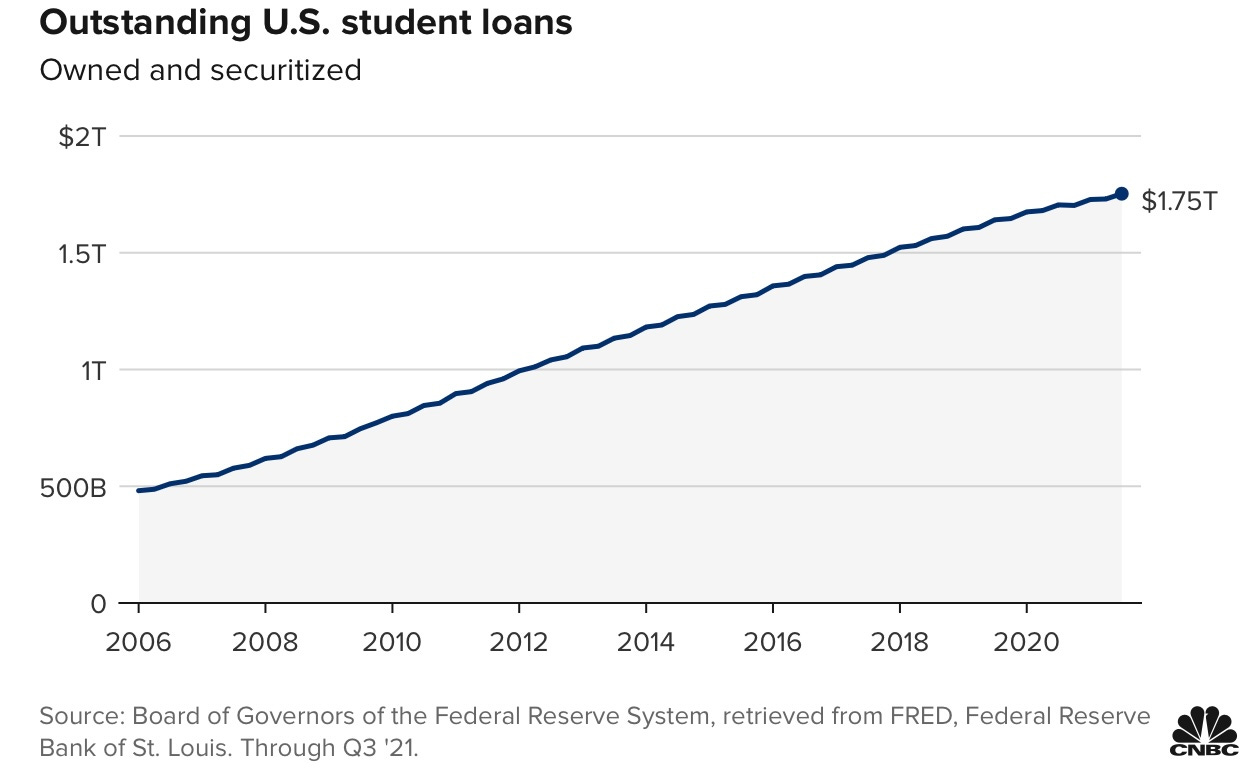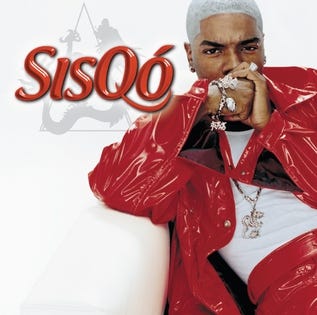Is College in America Still Worth It?
As wages remain stagnant across all strata of worker, it's time to revisit the value of a four year degree in the States - for both employee and employer.
A lot of us grew up with the mantra of “Work hard, get into a good school, and get a good-paying job,” as our barometer of success. The root of this could have been an economic ladder mindset - use education to get ahead in a new country for those first-generation Americans or get out of a disadvantaged economic situation for those of us with parents who made something out of, if not nothing, then less than something.
And that remained true, for a while. But as wages stop growing and the cost of post-secondary education soared, the equation became unbalanced. What used to be the ticket to a solid, middle-class life in America stopped being punched by the powers that be. While there may still be room in the labor market for college grads today, a confluence of factors are working to narrow this window for future valedictorians (and the rest of their graduating classes.)
The Value-Cost Equation
Many of those offering post-secondary education advice to their children - today’s millennials - went to school in the late 70s/early 80s. Back then, college made a good amount of sense, especially considering its cost: private 4-year colleges cost just over $10,000 a year (in 2018 dollars.) In 2020, that number was over 3x your parents’s cost at an average of $34,000.
That number may be shocking enough, but the real kicker here is the fact that these degrees simply have not delivered when it comes to remuneration.
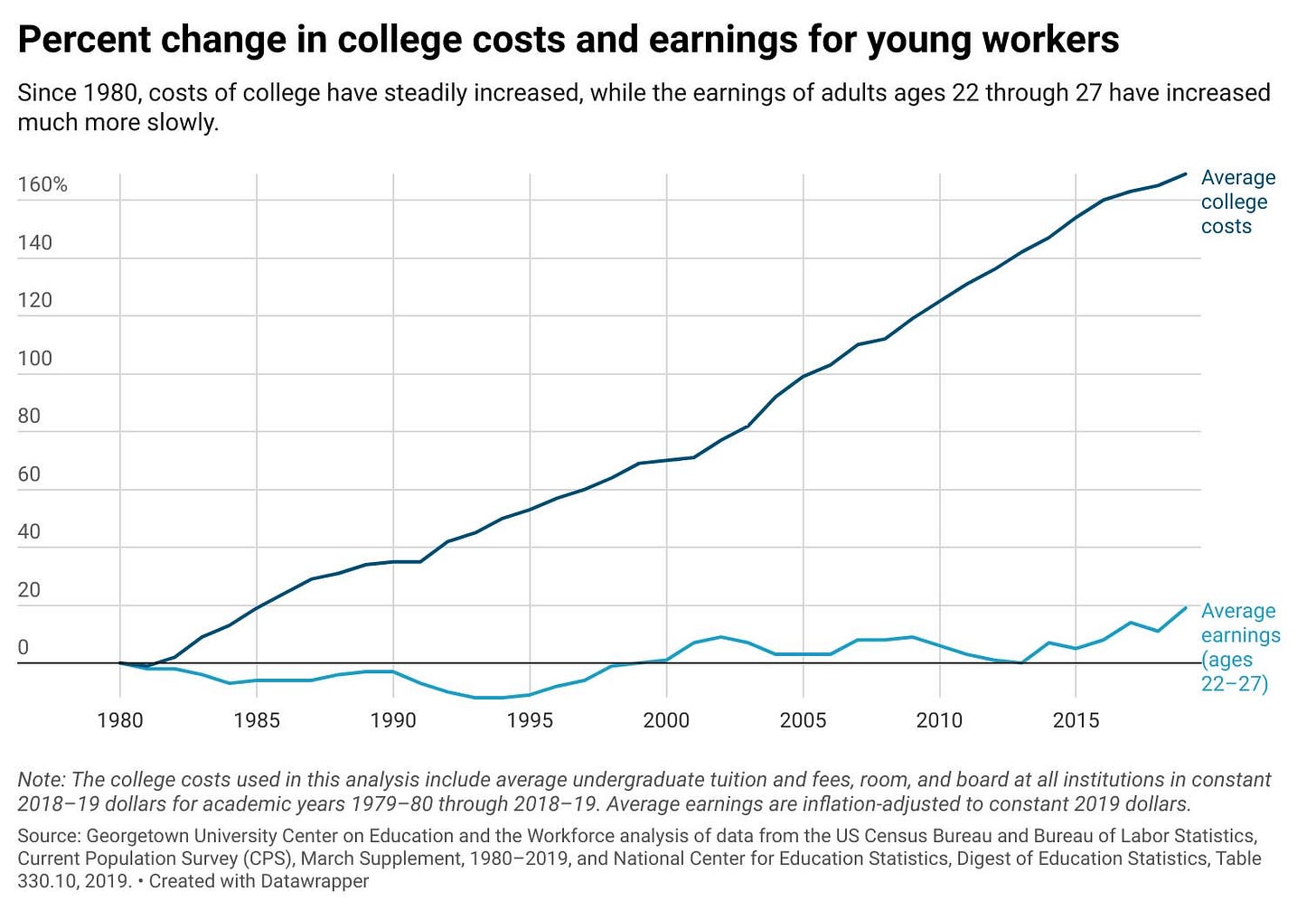
As college costs have soared, wages for all workers ages 22-27 have stagnated, rising only 20% in the 40 years it has taken college costs to skyrocket more than 160%. Now, it is true that on average those with a bachelor degree earn more than a high school diploma, but the story is no better when you isolate it by educational attainment:
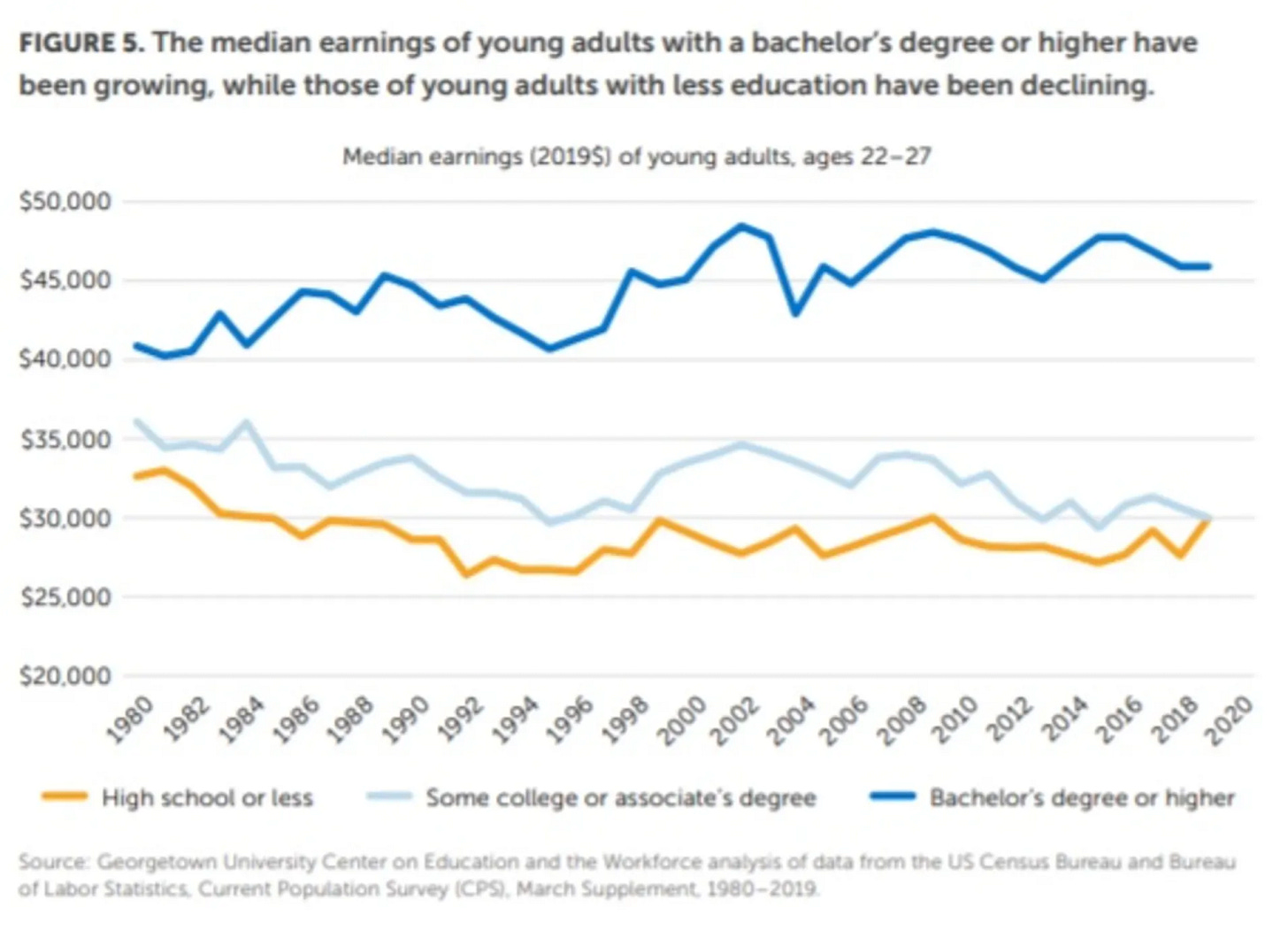
The insight here is clear: college costs continue to outpace inflation while providing very little in return in the form of wages.
So Are People Catching On?
While college is getting more expensive, maybe the people attaining post-secondary degrees aren’t doing it simply to make more money. Maybe fewer folks are going to college and are doing it more from a navel-gazing perspective as opposed to looking for a socioeconomic advantage? I regret to inform you, dear reader, they are not.
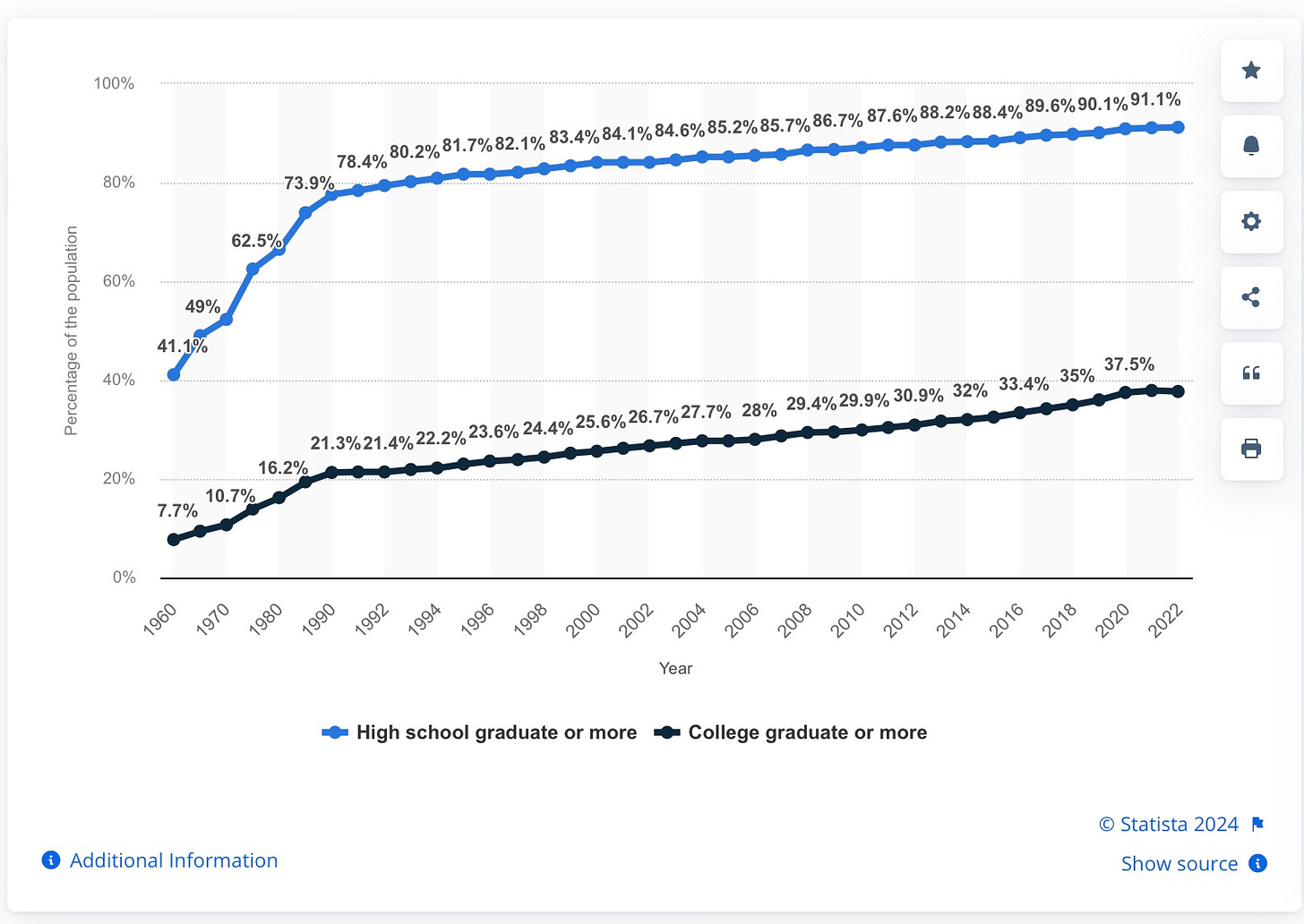
In spite of the rising cost of them, more and more people are getting college degrees. And the ballooning costs have led to another problem in the post-secondary education space: student debt.
College has gotten so expensive that people simply can’t afford it, but the colleges do need to get paid. And they are - more and more by private banks and public funds as opposed to actual students. With these types of funding sources, the incentive to stop hiking tuition is weak at best and non-existent at worse.
This has all led to an unprecedented debt crisis that sees the average debt load for grads at $30,000, up 3X from the 90s. In aggregate, there is over $1.7 trillion (with a T) of student debt in the US. Needless to say, this is not a sustainable model.
So Why Do We Keep Doing This to Ourselves?
So if we’re not getting the expected value out of college that we should, and it’s spiraling us into debt that has macroeconomic implications, why do we keep buying into this system?
Part of the reason is that many jobs in America have typically required it. In 2021, 44% of US jobs required a 4-year degree. Given that less than 40% of Americans hold a 4-year degree, this suggests that there is actually a “degree gap” in the States and that 4-year degrees are still worth attaining.
The reality is quite different, however. That 44% number? It’s off a high of 51% in 2017, so momentum suggests we’re heading down. And the skills-based movement is gaining steam and was buoyed a bit thanks to macroeconomic headwinds in the labor market following the 2008 global financial crisis. The movement is gaining momentum, even if McKinsey will only commit to looking at non-elite degree holders in addition to their current elite degree holders. Baby steps.
The movement intuitively makes sense - I rarely meet folks who actually use their bachelor’s degrees in their work responsibilities. Job functions that require hard skills like IT don’t need a bachelor’s requirement on top of it, especially as on-the-job training and experience is much more valuable than anything digested in a large lecture hall or a small roundtable liberal arts discussion.

So Again, Why Do We Keep Doing This to Ourselves?
The long and short of this is, it’s dictated by the companies doing the hiring. They are using bachelor degrees not as a hard skill requirement but as a heuristic that someone is competent enough to come in a mandated three days a week and get their work done.
But as anyone who has gone to college - and especially what would be considered an elite college - this is a very bad way to judge someone’s ability to do, well, anything. The amount of sheer stupidity that occurs on college campuses nationwide on a daily basis is astounding and a four-year degree means only that someone was able to get through four years of bureaucracy while passing classes that they got to pick based on the major that they, again, got to pick. That’s not exactly how a job works (in fact, I would argue academia and the private sector are on diametric opposite ends of the “What do you do for sustenance” spectrum.)
Even if there is correlation between academic performance and work performance, we all know correlation does not mean causation.
So Where Do We Go From Here?
To do away with this hiring shortcut would require a wholesale rethinking of the educational model in the United States; it’s not as simple as saying “Just remove the degree requirement from the job description” and patting oneself on the back.
The American public education system is nowhere near perfect, but the idea that four years between high school and college is the formative part of a young worker bee’s journey, where they turn from a block of marble into a fully carved entry-level rookie doesn’t ring true.
The trend appears to be going against the value of four year colleges - another labor market shock like we saw post-2008 may kill the four year degree requirement once and for all. Rather that mourn it passing, we should embrace it, and figure out a hardier way to replace it.
Grab Bag Sections
WTF Metro North: It’s a simple fact that rush hour trains are going to be full. In the current 2-3 setup, with two seats on one side and three on the other, it’s commonplace to see the two seaters fill up before anyone goes for the dreaded middle seat in the three seater.
Which makes the fact that twice in the past two months I have had people straight up refuse to move their items off of the second seat in the two seater when requested all the more baffling. The social contract in this country was already fraying when Covid hit, but something about the global pandemic has made people so unwilling to adhere to anything resembling togetherness in public that even this Bostonian/New Yorker thinks it’s a bit much.
Do better people.
Album of the Week: Doom scrolling the internet the other day I came across an impressive reel of Dru Hill performing live recently, with the energy and timing of twenty year-olds, when they’re over twice that age. That sent me down a rabbit hole of quality 90s R&B, which led me to this week’s AOTW: Sisqo’s Unleash the Dragon.
It’s a bit unfair to call this Sisqo’s debut album given his work as the lead singer with Dru Hill, but 5x platinum for his solo debut is still quite impressive. When Dru Hill went on hiatus, instead of going back to the Fudgery in Inner Harbor (shout out BMore), Sisqo struck out on his own and gave us one of the most insane songs of the 90s: the peerless “Thong Song.” This is the highlight of the album, but “Incomplete” (where Montell Jordan gets a writing credit) and the more upbeat “Got to Get It” are also solid.
The kids from Druid Hill would get back together after Sisqo’s sophomore was a slump, but the group was plagued by infighting with the label. Dru Hill and Sisqo had good careers, but this newsletter believes they should have been bigger stars given their talent.
Quote of the Week: “The most dangerous creation of any society is the man who has nothing to lose.” — James Baldwin
See you next week!





